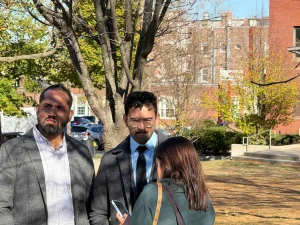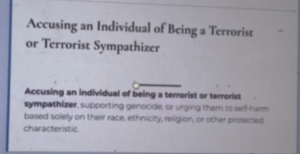Harvard University, where 33 student groups signed a statement blaming Israel for Hamas’s Oct. 7 attacks, now says that calling someone a “terrorist sympathizer” can violate the school’s anti-discrimination policies, according to a mandatory training for all Harvard students obtained by the Washington Free Beacon.
“Accusing an individual of being a terrorist or terrorist sympathizer, supporting genocide, or urging them to self harm based solely on their race, ethnicity, religion, or other protected characteristic” may violate school policies, a slide from the training says.
Other parts of the training suggest students can be sanctioned for mocking a wide range of religious institutions, including the Mormon Church, and for “denying the ancestral history of another person or group.” Actions including teasing, mocking, and ridiculing are described as “verbal abuse.”
![]()
Conducted by Harvard’s anti-discrimination office, the training also discusses anti-Semitism and anti-Zionism and appears to be a response to the Trump administration’s campaign against the school. But legal experts say the guidance goes far beyond what the law requires and has the potential to chill all kinds of protected speech, including criticism of the protesters who made Harvard exhibit A for campus radicalism run amok.
“Because each provision essentially vests unfettered discretion in the enforcing officials, they can—and, predictably, will—exercise that discretion in accordance with their own subjective values,” said Nadine Strossen, a former head of the American Civil Liberties Union. “And that will in turn lead certain members of the campus community—defined in terms of both identity and ideas—disproportionately to engage in self-censorship.”
David Bernstein, a law professor at George Mason University, argued that the “based solely on” caveat would do little to mitigate the training’s chilling effects.
“You have to be careful here,” Bernstein said. “Someone wearing a keffiyeh these days is generally expressing solidarity with the Palestinian cause, which in turn often (but not always) means being on Hamas’s side. Is calling someone a terrorist supporter who is wearing a keffiyeh ‘solely’ based on their ethnicity? You’d think the answer is ‘obviously not,’ but I’ve certainly seen people argue ‘it’s just an Arab cultural symbol.’”
Title VI, which applies to all recipients of federal funds, bans discrimination on the basis of race, ethnicity, and national origin. It does not, however, ban discrimination based on religion, except insofar as religious groups like Jews also count as an ethnicity.
The Harvard training goes beyond those requirements by singling out other faiths—including the Church of Latter Day Saints—for protection. Combined with the clause about “ancestral history,” it could cover critiques or send-ups of just about any religion, Bernstein said, turning even lighthearted jokes into potential infractions.
“Does the famous Inquisition scene in Mel Brooks’ History of the World count regarding Catholics?” Bernstein said. “The famous Monty Python scene with the People’s Liberation Front of Judea? Can no one make fun of the Mormon claim that Joseph Smith found those tablets in Rochester, or the history of Mormon (or Muslim) polygamy?”
Harvard did not respond to a request for comment about how it would handle such cases.
The training comes as the Trump administration is seeking a $500-million settlement with Harvard to restore the federal funding that was cut from the university in April. Though a federal judge blocked the cuts on Wednesday, Harvard has been negotiating with the White House behind the scenes and has acquiesced to some of its demands, including changes to the anti-discrimination bureaucracy that oversaw the training.
The university combined its Title VI and Title IX compliance efforts into a single office last month. And it hired a dedicated Title VI coordinator to address complaints of discrimination based on race and national origin, a move taken by other universities that have found themselves in the crosshairs of the Trump administration.
The training illustrates how this new layer of bureaucracy could fuel the sort of censorship that critics of higher education—especially on the political right—have long decried. It also shows how an apparatus built to combat anti-Semitism could in fact chill criticism of anti-Semites as schools seek to include ever more groups in their rubric of protected classes.

The term “terror sympathizer” was thrown around at Harvard because, less than 24 hours after the October 7 attacks, a coalition of 33 student organizations signed a statement holding “the Israeli regime entirely responsible for all the unfolding violence.” Anti-Israel protesters at the university chanted “long live the Intifada,” and an editor at the Harvard Law Review was even charged with assaulting an Israeli business school student who was attempting to walk through a “die-in” protest to reach his dorm.
The editor, Ibrahim Bharmal, was ordered to perform 80 hours of community service and attend anger management classes as part of a pretrial diversion program. In April, the law review awarded him a $65,000 fellowship.

The post Harvard Tells Students Calling Someone A ‘Terrorist Sympathizer’ Can Violate School Policy appeared first on .
Click this link for the original source of this article.
Author: Aaron Sibarium
This content is courtesy of, and owned and copyrighted by, http://freebeacon.com and its author. This content is made available by use of the public RSS feed offered by the host site and is used for educational purposes only. If you are the author or represent the host site and would like this content removed now and in the future, please contact USSANews.com using the email address in the Contact page found in the website menu.





